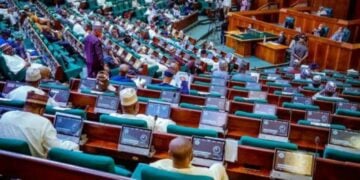The minister of Marine and Blue Economy, Adegboyega Oyetola, has said, the National policy on Blue Economy will tackle all challenges and unlock the full potential of the sector.
Experts have listed Illegal, Unreported and Unregulated Fishing, Environmental Degradation, unsustainable shipping, among others as challenges threatening the enormous potential inherent in the sector.
However, speaking at the technical workshop on the development of National Policy on Marine and Blue Economy, held in Lagos, on Tuesday, the Minister disclosed that the National Policy must be comprehensive to tackle all challenges and unlock the full potential of the sector.
According to Oyetola, a robust National Policy will ensure that the nation addresses challenges facing the sector through a comprehensive framework that aligns with international best practices.
“The National Policy we seek to craft must therefore be comprehensive to tackle all challenges and unlock the full potentials of the sector. However, these opportunities come with challenges and require a fitted approach to minimize unsustainable practices, environmental degradation, and illegal activities, such as Illegal, Unreported, and Unregulated (IUU) fishing.
“A robust National Policy will ensure that we address these issues through a comprehensive framework that aligns with international best practices while safeguarding our marine resources for future generations,” the minister stated.
Oyetola said, the national policy will reposition Nigeria as a dominant player in the marine and blue economy sector regionally and globally.
According to him, the policy is aimed at fostering sustainability, innovation, and inclusive prosperity in Nigeria’s maritime sector. He said these efforts are integral to ensuring that the sectors’ policies translate into tangible progress and measurable outcomes, saying the blue economy is a transformative pathway for nations seeking to balance economic growth with environmental sustainability.
He explained that Nigeria, with over 853 kilometers of coastline, extensive inland waterways, and a vast exclusive economic zone, the marine environment holds unparalleled opportunities, which range from fisheries and aquaculture to shipping, tourism, and renewable energy.
“This validation workshop is a milestone in our efforts to elevate Nigeria’s marine and blue economy. It is a product of diligent and inclusive policymaking that underscores our Ministry’s commitment to collaboration and precision. The Federal Ministry of Marine & Blue Economy has painstakingly developed strategies to guide the sustainable use of our marine resources.
“These efforts, supported by partnerships with the African Union Inter-African Bureau for Animal Resources (AU-IBAR) and other stakeholders, include the finalization of policies on fisheries and aquaculture in collaboration with WorldFish. These critical contributions are vital inputs into the National Policy on Marine and Blue Economy,” he said.
He said, it is worth noting that Nigeria has achieved notable progress in maritime governance, including the ratification and domestication of international protocols and conventions, saying these measures have strengthened the sector’s safety and security framework, resulting in a remarkable three-year period of zero incidence of piracy in the nation’s waters.
“Nonetheless, the recurring spate of boat mishaps underscores the pressing need for immediate action. This policy seeks to implement comprehensive strategies to ensure the safety of all waterways. However, challenges such as the spate of boat mishaps demand urgent attention, and this policy aims to establish comprehensive measures to enhance safety across our waterways.
“As we develop this policy, the ministry remains committed to repositioning Nigeria as a dominant player in the marine and blue economy both regionally and globally. We are also pursuing Nigeria’s candidacy for election into Category C of the International Maritime Organization (IMO), which underscores our determination to strengthen our voice in global maritime governance,” he pointed.
Meanwhile, the permanent secretary of the Ministry, Olufemi Oloruntola said, the validation workshop is a key step in shaping the National Policy on Marine and Blue Economy.
According to Oloruntola, the framework was designed to address Nigeria’s specific needs and aspirations while embracing sustainable development principles.
He further noted that the national policy will provide opportunity for stakeholders to review, refine, and enrich the draft Policy through a participatory and inclusive approach.
“The discussions here will ensure that the final document reflects practical solutions and innovative strategies, paving the way for a marine and blue economy that supports economic growth, job creation, and environmental sustainability.
“I commend the technical team and all stakeholders who have worked tirelessly to bring us to this stage. Your dedication and expertise are crucial, and I am confident that the outcomes of this workshop will reflect the collective efforts and insights brought to the table.
“I encourage all participants to engage actively and contribute meaningfully to the deliberations. This is a shared responsibility, and your insights are critical in ensuring that the Policy is not only comprehensive but also capable of driving measurable progress in the sector,” he added.
The Technical Validation Workshop brought together technical officers, head of government agencies, and industry stakeholders who are expected to refine the draft and provide input for finalising the National Policy.
The two-stage stakeholders’ workshops will culminate in December with an Executive Validation Workshop in Abuja.




